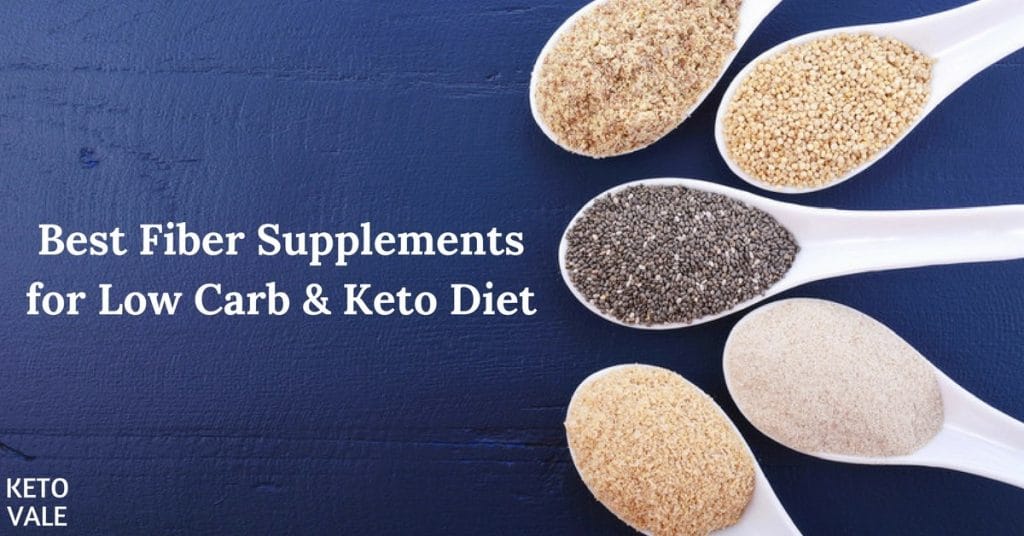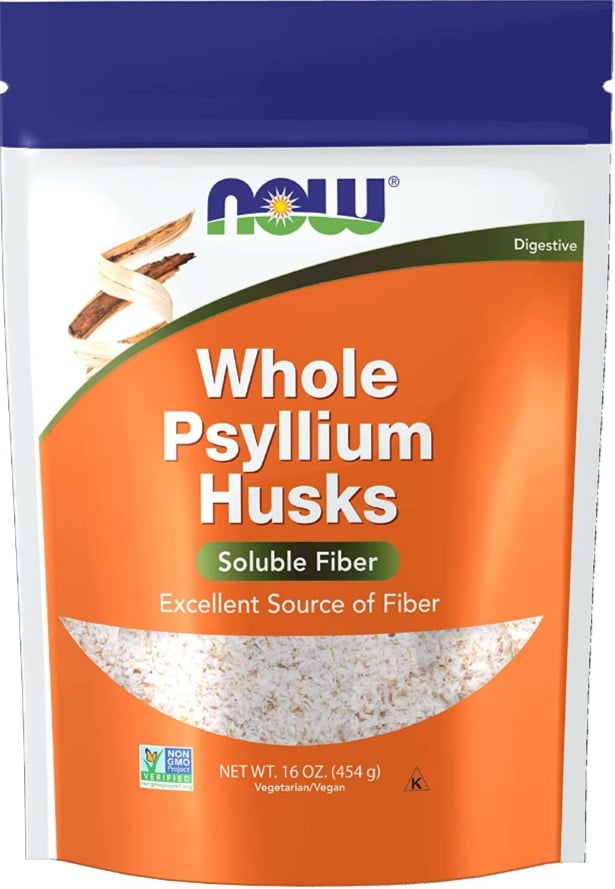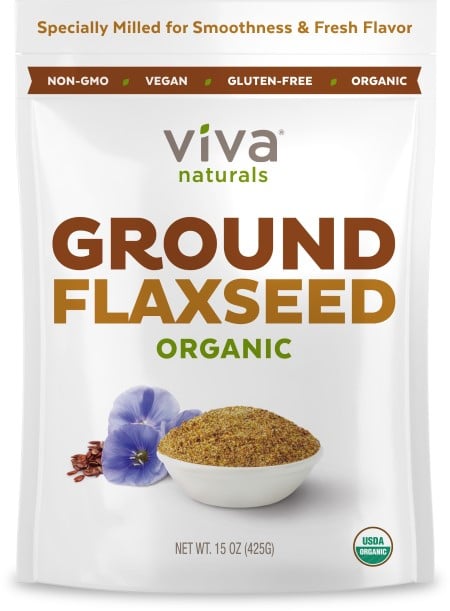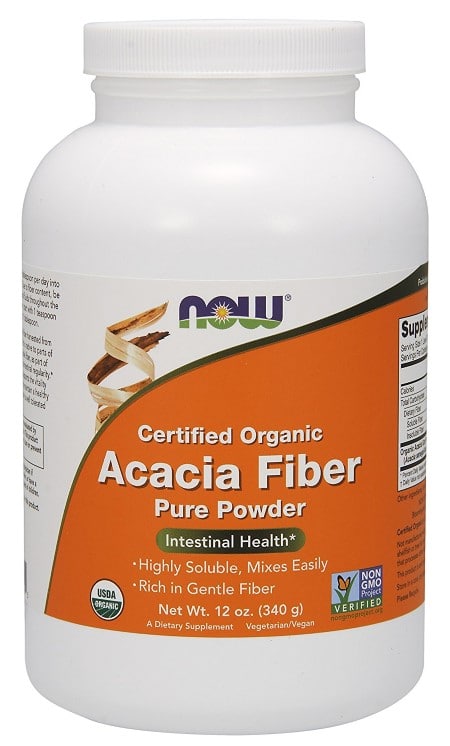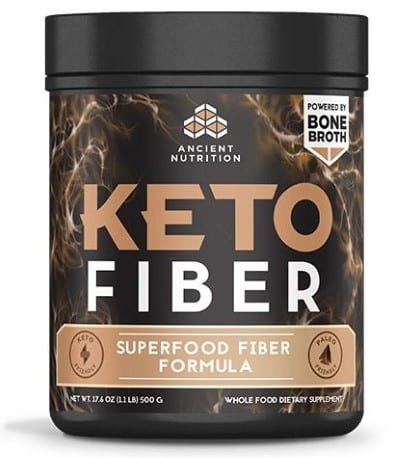If you want to improve your gut health, cholesterol levels, body weight, and bowel frequency, then consuming enough fiber will benefit you.
Did you know that eating a high fiber diet helps lower the risk of heart disease, obesity, and diabetes type 2? It also helps prevent hemorrhoids and may also reduce the risk of bowel cancer (1).
The problem? Most people don’t get enough of it. While the Institute of Medicine recommends a daily fiber intake of 25 grams for women and 38 grams for men, the average American only gets about 15 grams a day (2).
On the ketogenic diet, many people are concerned about not getting enough fiber. The reason is that we don’t consume grains – the common food group that is the primary contributor to fiber intake worldwide.
So the question becomes, how do you get enough fiber on a keto diet? What are the high fiber keto foods, supplements and sources that we can rely on?
Fortunately, it’s easy to get enough fiber – and thereby reap all the benefits associated with it – by taking a fiber supplement and eating low carb fiber rich foods. But which product is best for your personal situation? That’s what you’ll discover in this unbiased, evidence-based review. So, keep reading!
What is Dietary Fiber?
Dietary fiber is the indigestible carbohydrate found in food. Specifically, fiber that originates from the cell wands of plants, where it functions as a skeleton to help maintain shape and structure.
While there are many dietary fiber variations, we can broadly separate them into two categories, based on their solubility in water:
Soluble fiber, as the name suggests, is soluble in water. It forms a gel-like substance and swells when it mixes with water. Natural soluble fiber is present in high amounts in oats and oatmeal, barley, legumes (beans, lentils, peas), and fruit and vegetables (apples, oranges, and carrots).
Insoluble fiber, on the other hand, does not dissolve in water and is not absorbed. When consumed, it passes through the digestive system mostly intact. Insoluble fiber is present in high amounts in the layers of wheat bran, most beans, lentils, whole grains, vegetables, and flaxseed.The Benefits of Consuming Enough Fiber
“Eat more fiber.” That’s what health authorities have been telling us to do for years. And while not everything they say is correct – far from it! – it’s true that getting enough fiber benefits your health. Here are some health benefits linked to consuming fiber:
#1. Gut health
While humans can’t digest dietary fiber, our gut bacteria – of which we have around 100 trillion living in our intestine – can. In fact, feeding the ‘good’ bacteria is the primary function of fiber.
Having well-balanced gut flora benefits your health in many ways, such as helping with obtaining and maintaining healthy body weight, decreasing the risk of disease, and supporting brain function. One study found even that eating more fiber can help reduce brain inflammation during aging (3, 4).
#2. Weight loss
Soluble fiber binds to water in your intestine, which can slow the absorption rate of food and increase the feeling of fullness. This tends to pair with a decreased caloric intake, which is why consuming more dietary fiber can cause weight loss, as shown by a review study published in the journal a review study published in the journal Nutrition (5).
#3. Blood sugar
As already mentioned, dietary fiber can slow the absorption of nutrients. For this reason, consuming dietary fiber together with a meal can reduce spikes in blood sugar levels.
#4. Constipation
If you suffer from constipation, meaning that you have fewer than three bowel movements a week – or dry, small, and hard bowel movements that are difficult or painful to pass, then increasing your fiber intake might help, as shown by a review study published in the journal Alimentary Pharmacology and Therapeutics. The researchers found that increasing fiber intake in adults with chronic idiopathic constipation decreased symptoms among 77% of the subjects (6).
#5. Reduction in Cholesterol
A meta-analysis of 76 controlled studies published in The American Journal of Clinical Nutrition found that two to ten grams of soluble fiber daily leads to a small reduction in LDL and total cholesterol (7).
#6. Mood
Did you know that your gut and brain are connected? They even communicate with each other. Research shows that fiber can help improve cognitive health. One study found that children who added more fiber to their diet helped improve their cognitive control before they hit puberty (8).
Your digestive system also houses important neurotransmitters, such as dopamine and serotonin. Therefore, boosting your fiber intake and digestive health in general may help boost your mood. One study found that fiber can help alleviate symptoms of depression, anxiety and stress (9).
#7. Blood pressure
Research shows that fiber may help prevent a number of cardiovascular diseases and disorders. According to several studies, fiber can help improve arterial blood pressure (10, 11).
One study even found that hypertensive adults over 40 who ate more fiber improved their blood pressure levels better than younger subjects (12). This is good news if you’re looking to reduce your blood pressure naturally as you get older.
#8. Immunity
Fiber can help boost your immune system, which predominantly lives in your gut. One study found that soluble fiber can help strengthen the immune system and fight obesity-related diseases (13).
The authors of the study indicated that soluble fiber has anti-inflammatory effects. They also found that you don’t have to take a lot of it for it to be beneficial.
Further research shows that certain fiber, such as B-glucans, interact directly with immune cells to boost immunity (14).
#9. Inflammatory disorders
Research shows that higher intakes of fiber reduces the risk of mortality from digestive, circulatory, and non-cardiovascular and non-cancer related diseases (15).
#10. Mineral absorption
Adding more fiber to your diet can help you absorb minerals. One study found that SCFAs, which are produced in the gut, help enhance mineral intake. This is especially true in functional fibers, such as inulin, which have been associated with increased mineral uptake (16).
Fiber Intake on a Ketogenic Diet
First of all, dietary fiber is commonly found in high amounts in wheat bran, legumes (beans, lentils), whole grains (oats, brown rice), fruits (apples, oranges), vegetables (carrots, broccoli, Brussels sprouts), and flaxseed.
The problem? Most of these high-fiber foods are not keto-friendly foods. Vegetables are an exception, but the amount of fiber found in vegetables is relatively low compared to bran, whole grains, beans, and lentils.
That’s why following a high fat diet such as ketogenic diet may cause you to not get enough fiber (again, 25 grams daily for women and 38 grams for men).
And while the ketogenic diet is linked to a myriad of health benefits, not getting enough fiber can hamper your health, well-being, and body shape.
The solution? Take a keto-friendly fiber supplement. It’s an easy way add fiber to meet your daily requirement. Just consume it alongside your meal, in the right dosage, and you're good to go.
The Best Fiber Supplements For Keto Diet
Besides the fibers you get from eating low-carb leafy greens and vegetables, here is a very high-fiber low-carb food list you can use.
What follows are the three best keto-friendly fiber supplements to date. Each fiber comes from a different source, which gives each product unique benefits.
We’ve selected this unbiased keto fiber supplement list by carefully evaluating every option on the market. So, if you’re looking for an excellent keto-friendly fiber supplement, then you can’t go wrong with these three.
Side note: If you’re wondering whether fiber supplements are keto-friendly, the answer is yes. Even though fiber is a type of carb, we can’t digest it. As a result, we can’t use fiber for energy, it doesn’t negatively influence blood sugar, and it doesn’t hamper ketosis.
#1. NOW Psyllium Husk Powder
Psyllium is a form of soluble fiber derived from the husk of the Plantago ovata plant's seeds.
It functions as a bulk-forming and gentle laxative, which makes bowel movements much easier. That's why this fiber form is an excellent option for those who suffer from constipation.
Psyllium husk also benefits gut flora. And because this fiber soaks up water in your gut, it also increases satiety and can thereby aid weight loss.
NOW provides an excellent psyllium husk powder at an affordable price.
Their products are tested monthly on purity and quality, by skilled technicians at their in-house state-of-the-art testing laboratory.
Pros
- Effective for treating constipation
- Aids weight loss
- Benefits gut flora
- Affordable price
- Quality tested
Cons
- Doesn’t mix perfectly
- Doesn’t taste great
How to use:
Consume one tablespoon (9 grams) of NOW Psyllium Husk Powder once a day with a meal, alongside some form of liquid, such as one cup (250 milliliters) of water.
Psyllium Husk Powder is also used in many keto baking recipes, such as Low Carb Buns and Keto Bread.
Optional Choice: Psyllium Husk Pills
If you don't want to use the powder form and you want a convenient way to take more Psyllium Husk fiber into your diet, you can try the NOW Psyllium Husk Capsules.
#2. Viva Naturals Organic Ground Flaxseed
Flaxseed (Linum usitatissimum), is a food and fiber crop that's been gaining a lot of popularity lately due to its high content of fiber, omega-3 fatty acids, and other beneficial nutrients.
Each 100 grams of flaxseed delivers roughly 27 grams of fiber while providing just 1.5 grams of digestible carbs. This makes flaxseed an excellent option to get enough fiber on the ketogenic diet.
While there are many flaxseed products on the market, Viva Naturals sets itself apart in various ways. First off, their product is 100% organic, which means it contains fewer pesticides but more beneficial nutrients, such as antioxidants.
Viva Naturals uses a unique sifting system that reduces the number of whole or broken seeds. This has two amazing benefits. One is that it leads to a fine, super-soft, and light mill that easily mixes with your food, including smoothies and juices.
Besides, this process exposes lignans and valuable nutrients that are trapped within the whole seed, thereby increasing the amount of beneficial nutrients your body can uptake.
Pros
- High in omega-3 fatty acids
- Aids weight loss
- Benefits gut flora
- Affordable price
- Very fine and soft mill
- Helps with constipation
- Mixes easily with smoothies and juices
- 100% organic and non-GMO
Cons
Flaxseed acts estrogenically, so relying on it as your main and only fiber source isn’t recommended.
How to use:
Add two to three tablespoons (28 to 42 grams) of ground flaxseed to your favorite food or drinks daily.
You can also use Flaxseed in many keto baking and frying recipes such as Keto Blueberry Muffins with Almond Meal and Flaxseed, Flaxseed Chips, Zucchini Fries With Flaxseed Meal, etc...
#3. NOW Organic Acacia Fiber Powder
Acacia fiber, also known as acacia gum and gum Arabic, is a soluble fiber derived from the sap of the Acacia Senegal tree, which grows all over Africa and in parts of India. 100 grams of acacia fiber contains around 90 grams of fiber.
Acacia fiber is linked to many health benefits. For example, research published in American Journal of Cardiology found that 15 grams of acacia fiber daily, in liquid form, helped with managing plasma cholesterol concentrations in blood (17).
Acacia fiber also seems to be effective in aiding weight loss. Research published in Nutrition Journal found that consuming 30 grams of acacia fiber powder for six weeks led to a lowered body weight and an average body fat reduction of 2% (18).
When it comes to acacia fiber products, NOW stands head-and-shoulders above its competitors.
NOW offers an organic, gluten-free, 100% acacia fiber product that mixes well, at a reasonable price.
Pros
- Very high fiber content (~90%)
- Aids weight loss
- Benefits cholesterol levels
- Helps with constipation
- Affordable price
- Mixes well with smoothies and juices
- Organic
Cons
- Doesn’t taste great by itself
How to use:
Mix one tablespoon (nine grams) of organic acacia fiber powder into at least 8 ounces (237 milliliters) of water or juice and consume one serving daily.
#4. Ancient Nutrition Keto Fiber
Ancient Nutrition Keto Fiber powder is specially formulated for people on the keto diet. It includes a high-fiber superfood plant-based blend that helps fill in nutritional gaps associated with a low-carb diet.
It contains chia seeds, flaxseeds, and cinnamon with coconut MCTs to boost ketone production and fermented herbs to support digestive health.
One scoop of Ancient Nutrition keto fiber powder contains 40 calories, 2 grams of fat, 7 grams of carbs (2 grams net carbs), 5 grams of fiber, and 4 grams of protein.
We like that this fiber supplement provides a natural source of healthy omega 3 fatty acids to help you absorb the antioxidant from the herb blend.
The powder is sweetened with monk fruit extract and luo han guo fruit, which further contributes to its fiber and antioxidant content.
Pros
- Contains keto-friendly additives, such as MCTs from coconut
- Provides 5 grams of fiber and 2 grams of net carbs per serving
- Features an antioxidant fermented herb blend to help boost digestive health
- Specially formulated for keto dieters
- 30-day money back guarantee
Cons
- Does not contain as much fiber as other blends
How to use:
Mix one scoop of powder into 8 ounces of water or almond milk one or more times per day
So, What’s the Best Fiber Supplement for Keto Dieters?
As we’ve seen, getting enough fiber supports your health in many ways. These include improving your gut health, cholesterol levels, body weight, and bowel frequency.
Since most people – including those on a ketogenic diet – don’t consume enough fiber, supplementing it is an easy way to enjoy the benefits linked to sufficient fiber intake.
So, which product is best for keto dieters? While that’s a tough decision to make because each fiber type has its unique benefits, if we compare the three excellent products outlined above, then we conclude that the psyllium husk powder by NOW deserves the #1 spot.
NOW delivers an excellent psyllium husk powder at an affordable price, and they have skilled technicians testing their products monthly, on purity and quality.
If you want to upgrade your health and well-being starting today, then we highly recommend you click the link below and start supplementing with the psyllium husk powder by NOW.
